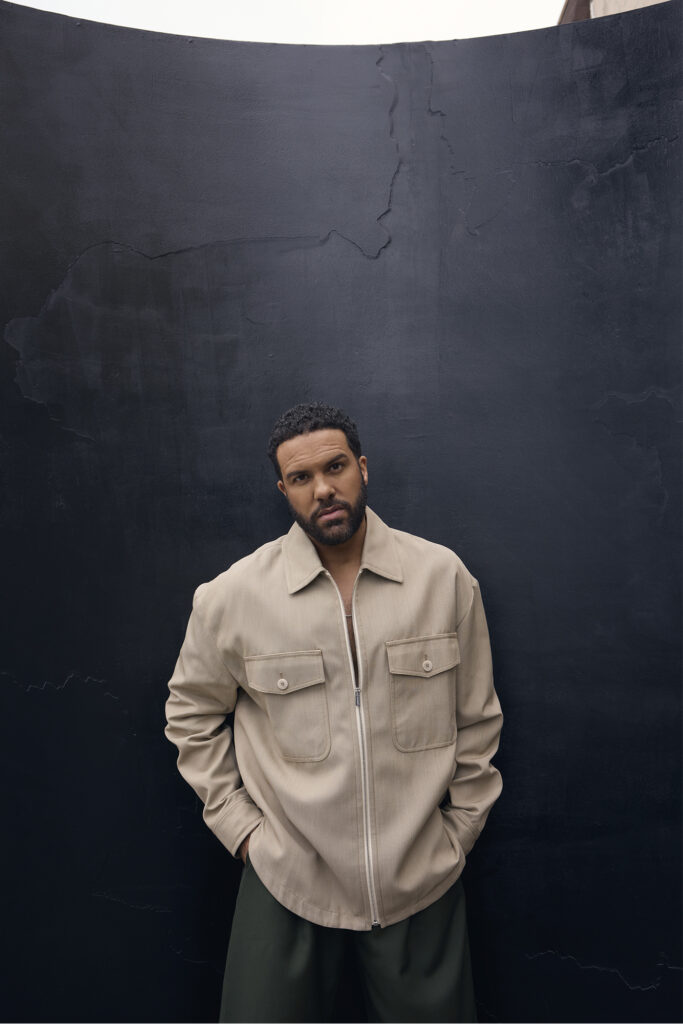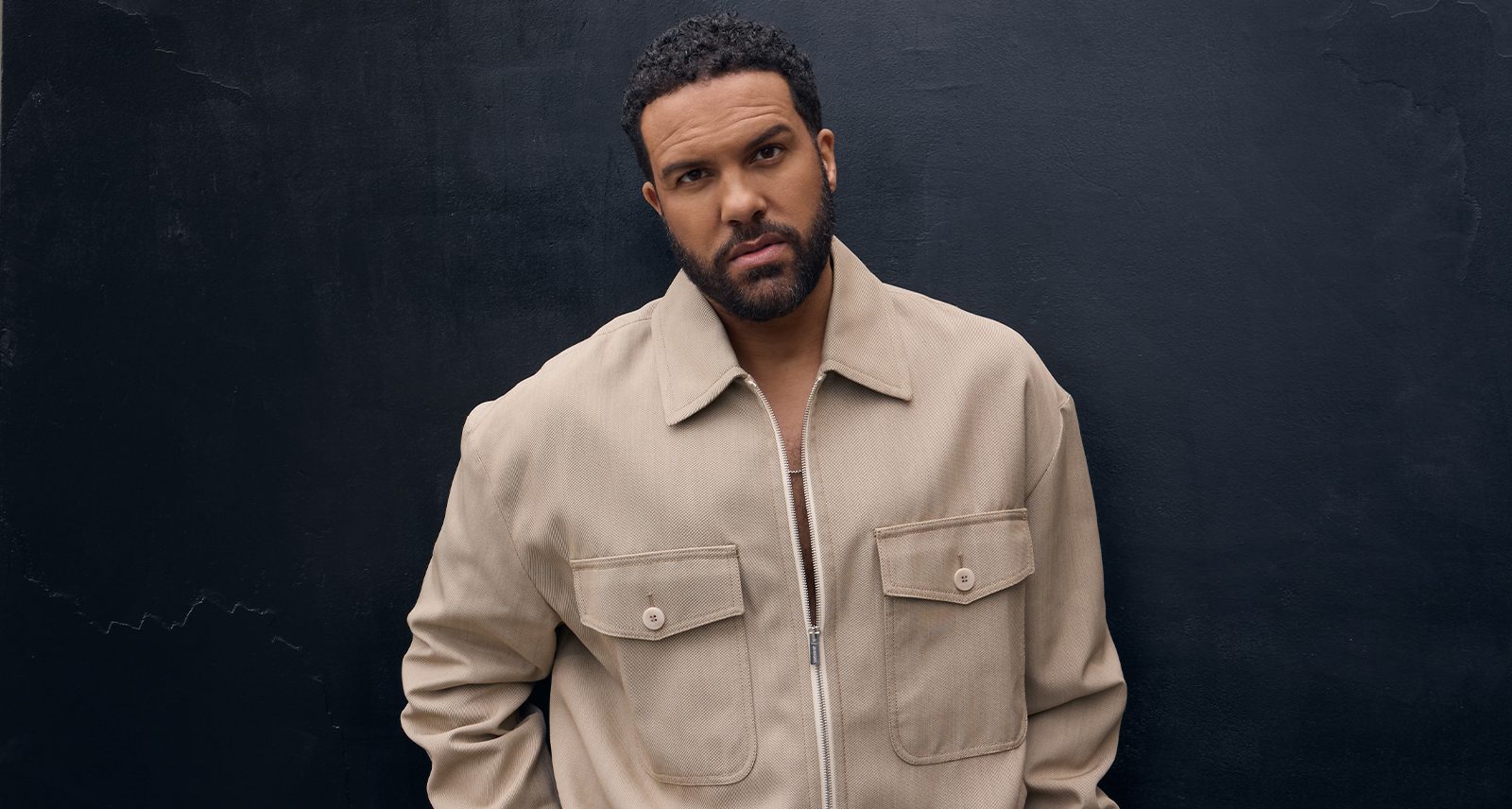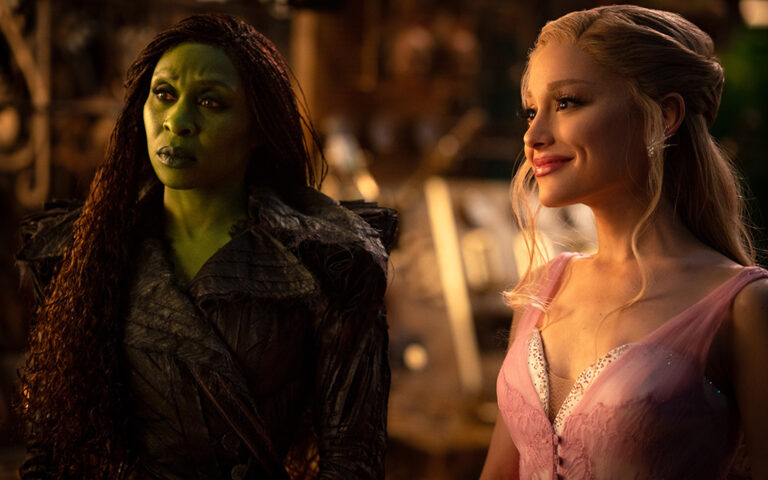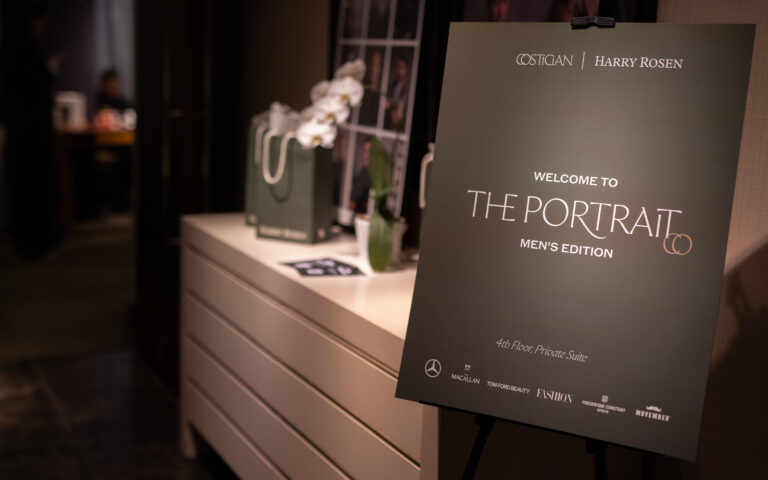O-T Fagbenle defies categorization. He’s perhaps best known for his role as Luke in The Handmaid’s Tale, though the actor has taken on many titles since his 2017 breakout. In Showtime’s The First Lady, he was President Barack Obama opposite Viola Davis; shortly after, he moved into Marvel with a role in 2021’s Black Widow. Then, just last year, Fagbenle jumped into comedy with Loot — alongside genre champion Maya Rudolph — and played a prosecutor in the Golden Globe-nominated Presumed Innocent (a collaboration with SHARP cover alum Jake Gyllenhaal). Yet Fagbenle’s creative journey didn’t begin with a pilot episode or theatre troupe; it was a saxophone that first led him to the stage.
“[Art] doesn’t have to be this elitist thing — it can be for the people by the people.”
O-T Fagbenle
“My grandma had rented me a saxophone because they wanted to see if I’d stick to it when I was ten,” the actor laughs over Zoom. Sitting in a sun-filled room, Fagbenle is all smiles as he tells me about his early years. Born in London, the actor spent time in Spain and Nigeria before returning to Great Britain; it was an eclectic experience that gave him plenty of exposure to the arts. Soon after he got the rental sax, Fagbenle recalls joining a Spanish group called the South Coast Jazz Band. He began performing locally, joining community productions and learning from those around him.
“I was very much in my infancy as an artist, watching and learning from these great practitioners — that’s the bedrock,” the actor says. Peppered with performances at youth centres and retirement homes, Fagbenle calls his early years “grassroots” — he looks back on the era with fondness. “All of that was, I don’t know, just extremely gratifying. It taught me a lot about what the purpose of art can be in this world. It doesn’t have to be this elitist thing — it can be for the people by the people.”

As Fagbenle branched out, he kept these values close. When the family relocated to London, the young saxophonist got involved with his local drama scene — a move that later proved invaluable. “I was doing local African theatre with the late great Rufus Orisayomi, who was an African theatre practitioner,” explains Fagbenle. “I would come on during the intervals of his plays and play a little saxophone ditty and then go off. Eventually, he started to give me a couple of lines in the play and within a year, I was playing the lead in an African adaptation of Macbeth.” With a speech from the Shakespeare adaptation, Fagbenle secured a spot at the Royal Academy of Dramatic Arts (RADA), where he studied professional acting.
This wasn’t a full departure from music, he explains. “One of the things about African theatre — at least the African theatre that I was part of — is that there isn’t this obvious delineation between actor and dancer and singer and drummer and musician,” Fagbenle says. Instead, the actor describes a symbiotic relationship between acting, music, and writing; all these forms of creativity are connected. “It’s like a tapestry of the performing arts. So, I’ve never thought of myself as just an actor in a way, you know? All of those things — even though I’m not really skilled in a lot of them — are part of my tools as a performer.”
“When I got back to acting after doing my first short film, [I had] a little more humility about my place in the machine. I really feel privileged to be able to write stories and to have them manifest on-screen.”
O-T Fagbenle
Transitions still pose a challenge, of course. Graduating from the stage to the screen was a ten-year learning curve, Fagbenle says, adding: “but, you know, you have to have your apprenticeships phase of your career.” And, in some ways, the actor has retained his apprentice mentality. When I ask about choosing roles, for instance, he tells me that he looks at each part as a chance to grow. “I get so much from working with people who are smarter than me and more talented than me,” Fagbenle says. “People I can learn from.”
These opportunities appear off-camera, too. When he’s sitting in the director’s chair or hopping into the writers’ room, Fagbenle sees his work from a new perspective. “When you’re an actor, it can be easy — especially on television — to believe that you’re the most important thing around. Then, when you get to directing, you’re like, ‘Well, yeah, the performance is important, but if that focus puller isn’t in focus, then that performance is thrown away,'” he explains with a laugh. “I realized, with much more profundity, how important everybody else on the set was. It helped me. When I got back to acting after doing my first short film, [I had] a little more humility about my place in the machine. I really feel privileged to be able to write stories and to have them manifest on-screen.”
“That’s the power of art. It can be so intimate, it can be so specific to someone’s life experience.”
O-T Fagbenle
Artistically, this lesson pays dividends. Humility is crucial to all components of the craft, Fagbenle explains; in storytelling, substance comes from vulnerability. When our conversation drifts towards writing, he quotes a mentor, Ché Walker. “[He] once told me, ‘If you write something and when you give it to someone, you don’t have a feeling like, ‘Oh my God, they’re reading my diary!’ then you haven’t written anything worth anything, really.” This, he’s quick to add, doesn’t mean that all plots should be autobiographical — instead, it’s about infusing those feelings into a fictional setting. “Even if you’re writing about aliens,” he laughs, “it can be intimate to your life story.”
As Fagbenle describes it, performance is triangular: it’s a dynamic, ever-changing relationship between the artists, the artwork, and the audience. “The artist and the art are supposed to put something out there — a different way of looking at the world — they just bring their interpretation of the world to the person experiencing the art. Then the viewer, in turn, interprets that into their own experience,” he says.
The more intimate a performance, the more it seems to resonate with viewers. Fans of The Handmaid’s Tale have eagerly told the actor how they connected with Luke’s storyline. Across each project, connection is a constant goal. “That’s the power of art. It can be so intimate, it can be so specific to someone’s life experience,” Fagbenle says. “Somebody might watch something and be like, ‘My goodness, I was that kid!’”

Of course, a good story doesn’t require the audience to have direct experience; it’s the emotional depth that viewers relate to. Fagbenle cites his own experience with media like The Wire and Hamilton to explain how art can offer a window into different walks of life. Storytelling should allow viewers to connect with the narrative, even if the world is entirely unfamiliar — that’s diversity, Fagbenle says. In fact, these are the stories he strives to tell: “I’ve got very specific experiences as someone who’s grown up in Nigeria, in Africa, and has had the family that I have. So, I really appreciate the opportunity to tell my stories because I think other people will be able to enjoy it and get something from it as well.”
On the subject, the actor adds that creativity is a family affair. He regularly works with brothers Oladapo (Daps) Fagbenle and Luti Fagbenle, calling the latter “an extraordinary producer.” Bouncing between his life in music, theatre, and film, we can’t help but return to the idea of art as a tapestry: creative chameleon-isms seem to underpin every aspect of Fagbenle’s career. “It’s very eclectic,” he laughs. Yet the actor describes his work in simple terms. If there’s one takeaway from it all, he says it’s optimism: “I just hope people keep hope alive.”



